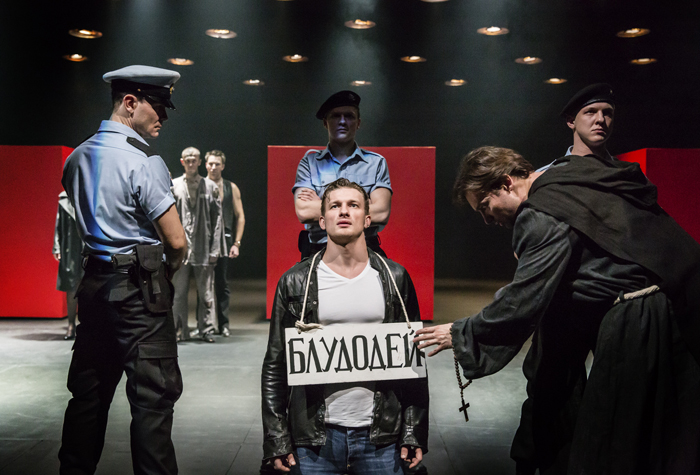What happens when one man holds absolute power over a state? And if this man abuses his power, where do his innocent victims go for help?
Cheek By Jowl, in partnership with Moscow’s Pushkin Theatre, explore these very contemporary issues in this fascinating, not to be missed, Russian language version of Shakespeare’s Measure for Measure.
The set is bare, save for five huge red cubes at the back of the stage, some hanging lights, and a desk and chair. It’s stark, but not cold. What rouses the imagination is the movement of the actors. When one moves they all move, in a seamless formation dance. You follow them and don’t notice as they drop a character, or pick another up, in the changing of a scene. They’re a river coursing through the play, gaining and losing debris in its wake.
Autocrat Angelo is put in charge to clean up the debris of corruption as the Duke makes it known that he is going away for a while. In fact he disguises himself as a friar so that he can witness this crackdown. Andrei Kuzichev’s Angelo is a frightening, and all too believable, government bureaucrat. He has been tasked with a job: to clear the city of vice. And he is going to do it. There will be no excuses, no defence. He considers himself incorruptible. But then Isabel walks into his office. Her brother has been sentenced to death for fornication, and she has come to plea for his life. She is preparing to be a nun, and, somehow, her very purity fills Angelo with the lustfulness he is so keen to purge. He makes her an offer: if she gives him her virginity, he will free her brother.
Anna Khalilulina’s Isabel is electrifying. Her emotional intensity is mesmerising, and when Angelo reminds her that no one will believe her if she accuses him, her horror is etched on her face.
Of course, this being a ‘comedy’, it all works out in the end. But does it? The grandiose final scene where the Duke comes back and fixes everything brilliantly captures the difficult ambiguity of the ending. Is he the good guy here? In this version his cowardice and hypocrisy are obvious, and his delight at returning to power as he manipulates the invisible crowd leaves a feeling of foreboding regarding his future rule.
Watching the play made me wish I was a Russian speaker, so that I could watch the interplay of characters without having to look up at the surtitles. Delivered at a rapid pace, it’s impossible to keep up with every word, but the main thrust of each scene is never lost, and it’s a treat to watch the Pushkin Theatre at work.
An excellent contemporary examination of the corrupting force of power. ★★★★☆ Deborah Sims 29/04/15


